Strategic Analysis of Leadership and Management at Corus Steel Company
VerifiedAdded on 2021/02/20
|16
|5327
|93
Report
AI Summary
This report provides a comprehensive analysis of leadership and management practices within Corus, a steel-making company. It begins by defining leaders and managers, highlighting their similarities and differences, and then explores their roles within organizational contexts, supported by relevant leadership theories such as behavioral, transformational, and classical management theories. The report examines the application of situational, system, and contingency theories in different scenarios, including cultural differences and the implementation of new technologies. It also assesses the impact of external business environment factors on decision-making and proposes improvements in operational efficiency to meet business objectives. The report concludes with recommendations for future improvements in leadership and management approaches within Corus, providing a strategic overview of the company's operational and leadership dynamics.
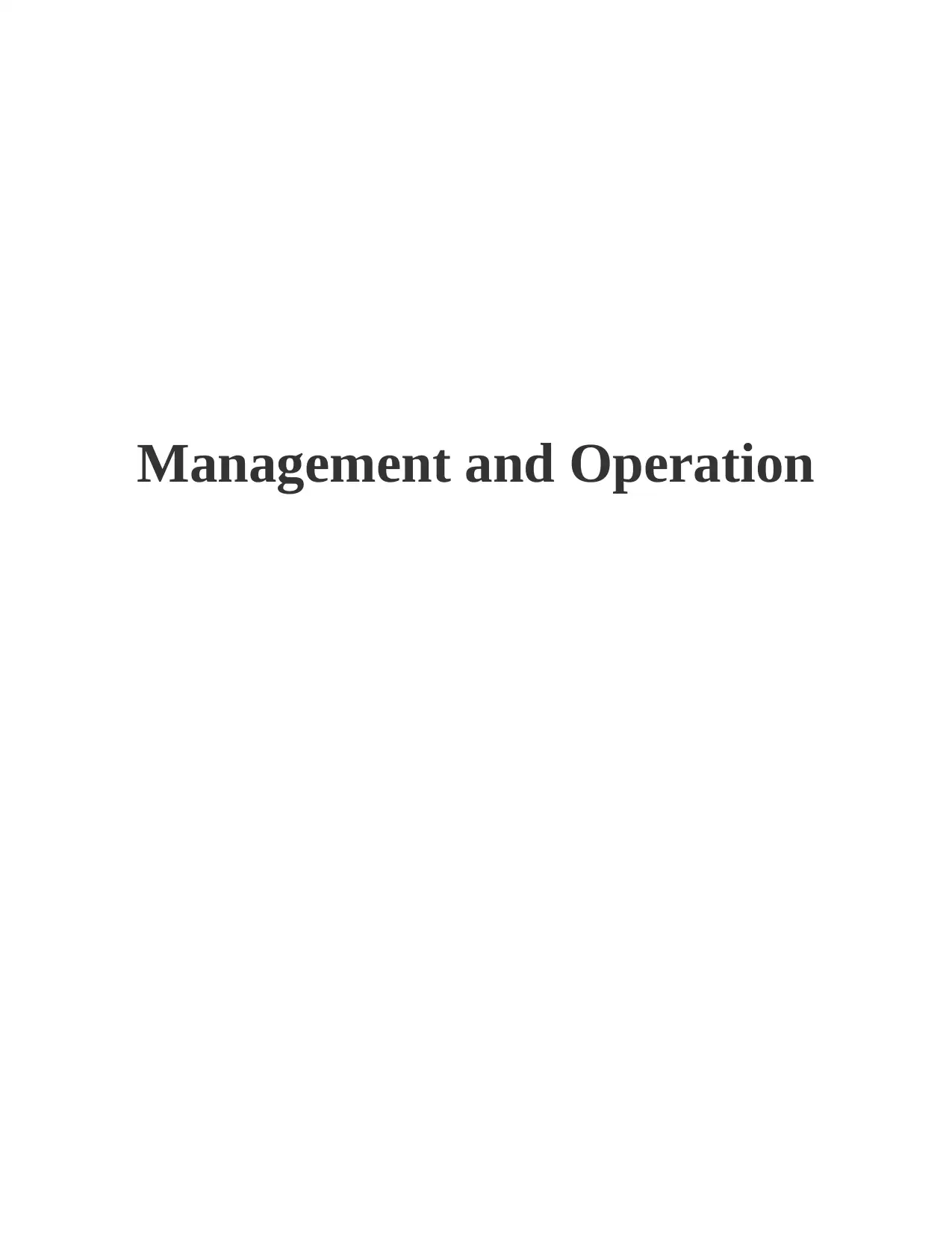
Management and Operation
Paraphrase This Document
Need a fresh take? Get an instant paraphrase of this document with our AI Paraphraser
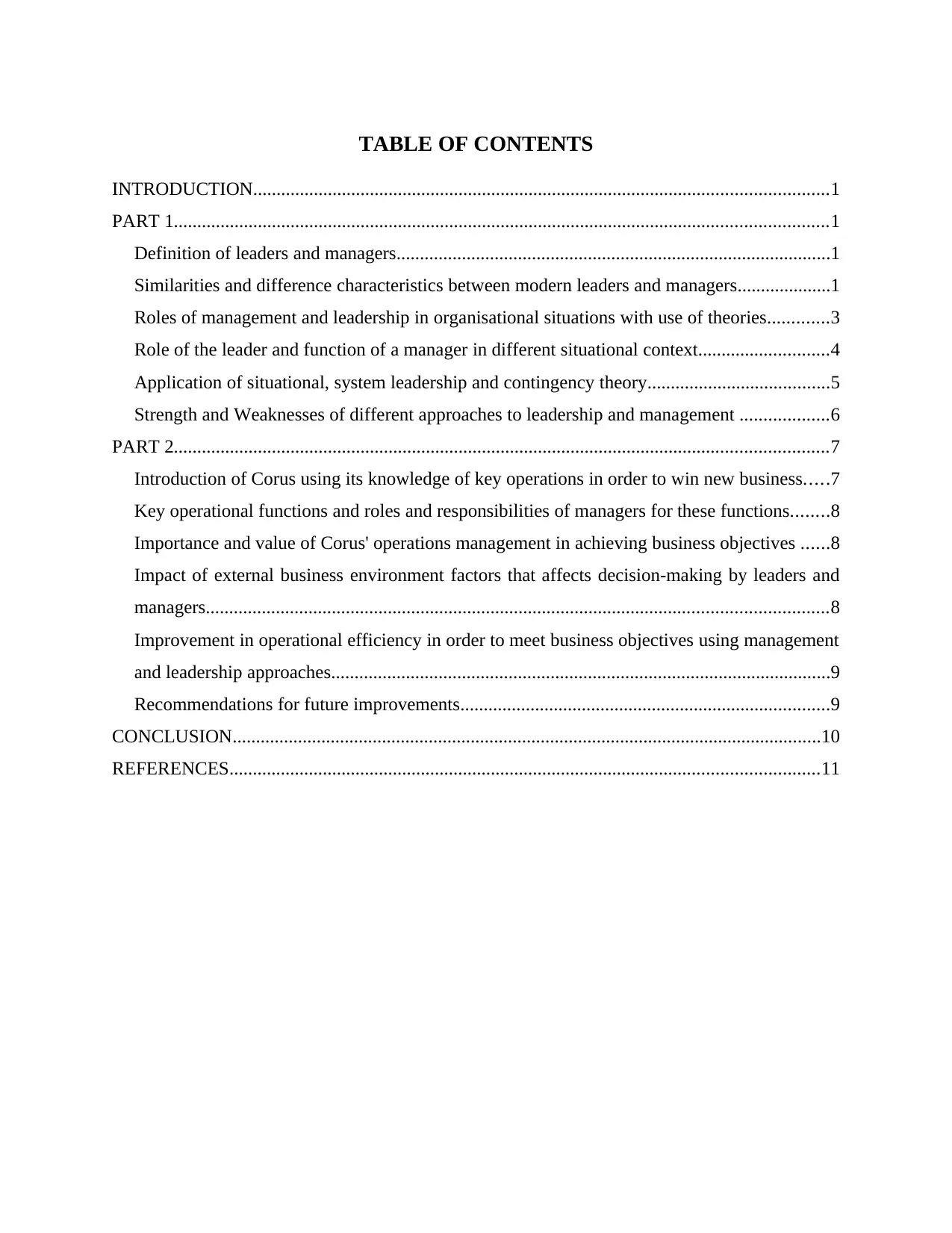
TABLE OF CONTENTS
INTRODUCTION...........................................................................................................................1
PART 1............................................................................................................................................1
Definition of leaders and managers.............................................................................................1
Similarities and difference characteristics between modern leaders and managers....................1
Roles of management and leadership in organisational situations with use of theories.............3
Role of the leader and function of a manager in different situational context............................4
Application of situational, system leadership and contingency theory.......................................5
Strength and Weaknesses of different approaches to leadership and management ...................6
PART 2............................................................................................................................................7
Introduction of Corus using its knowledge of key operations in order to win new business.....7
Key operational functions and roles and responsibilities of managers for these functions........8
Importance and value of Corus' operations management in achieving business objectives ......8
Impact of external business environment factors that affects decision-making by leaders and
managers.....................................................................................................................................8
Improvement in operational efficiency in order to meet business objectives using management
and leadership approaches...........................................................................................................9
Recommendations for future improvements...............................................................................9
CONCLUSION..............................................................................................................................10
REFERENCES..............................................................................................................................11
INTRODUCTION...........................................................................................................................1
PART 1............................................................................................................................................1
Definition of leaders and managers.............................................................................................1
Similarities and difference characteristics between modern leaders and managers....................1
Roles of management and leadership in organisational situations with use of theories.............3
Role of the leader and function of a manager in different situational context............................4
Application of situational, system leadership and contingency theory.......................................5
Strength and Weaknesses of different approaches to leadership and management ...................6
PART 2............................................................................................................................................7
Introduction of Corus using its knowledge of key operations in order to win new business.....7
Key operational functions and roles and responsibilities of managers for these functions........8
Importance and value of Corus' operations management in achieving business objectives ......8
Impact of external business environment factors that affects decision-making by leaders and
managers.....................................................................................................................................8
Improvement in operational efficiency in order to meet business objectives using management
and leadership approaches...........................................................................................................9
Recommendations for future improvements...............................................................................9
CONCLUSION..............................................................................................................................10
REFERENCES..............................................................................................................................11
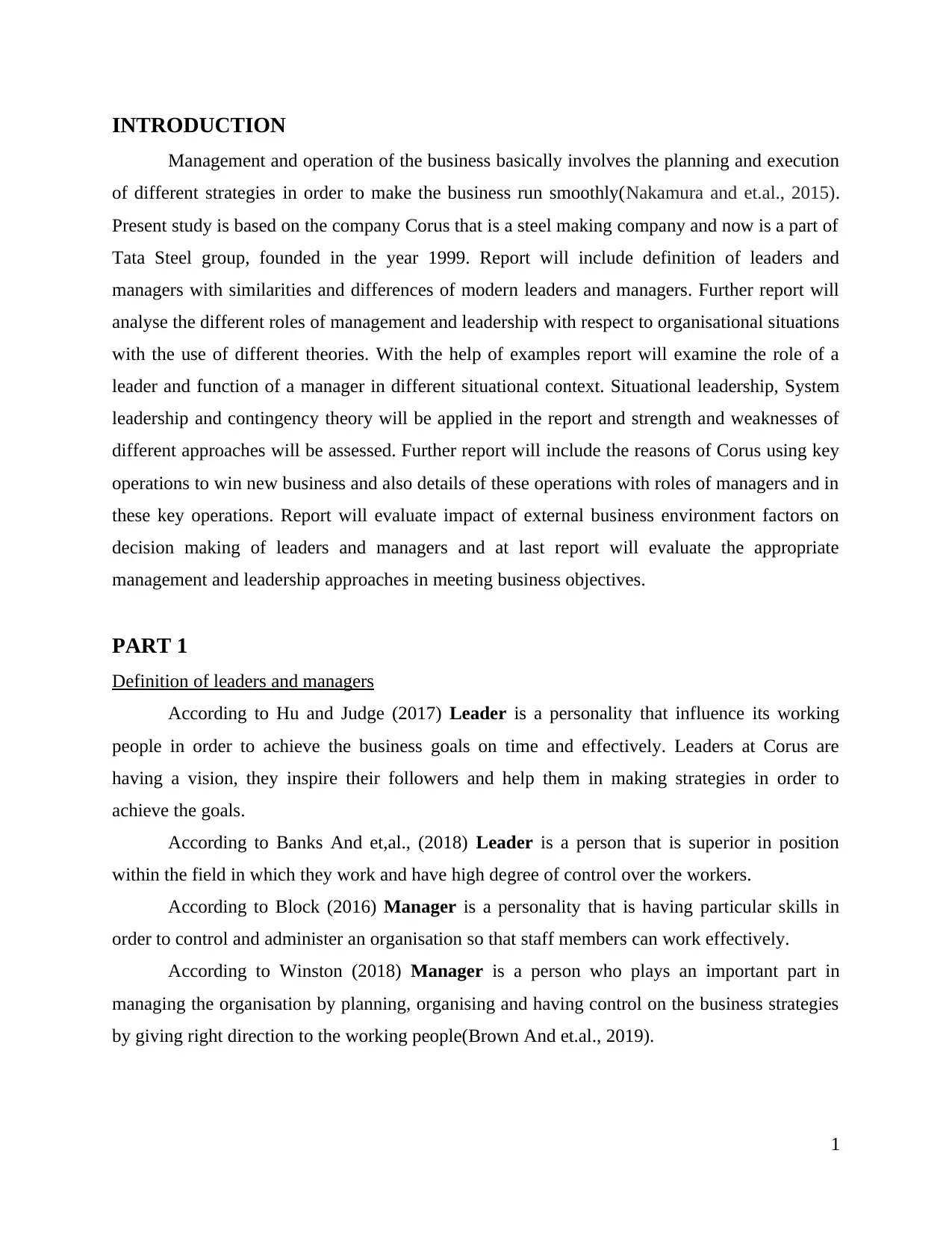
INTRODUCTION
Management and operation of the business basically involves the planning and execution
of different strategies in order to make the business run smoothly(Nakamura and et.al., 2015).
Present study is based on the company Corus that is a steel making company and now is a part of
Tata Steel group, founded in the year 1999. Report will include definition of leaders and
managers with similarities and differences of modern leaders and managers. Further report will
analyse the different roles of management and leadership with respect to organisational situations
with the use of different theories. With the help of examples report will examine the role of a
leader and function of a manager in different situational context. Situational leadership, System
leadership and contingency theory will be applied in the report and strength and weaknesses of
different approaches will be assessed. Further report will include the reasons of Corus using key
operations to win new business and also details of these operations with roles of managers and in
these key operations. Report will evaluate impact of external business environment factors on
decision making of leaders and managers and at last report will evaluate the appropriate
management and leadership approaches in meeting business objectives.
PART 1
Definition of leaders and managers
According to Hu and Judge (2017) Leader is a personality that influence its working
people in order to achieve the business goals on time and effectively. Leaders at Corus are
having a vision, they inspire their followers and help them in making strategies in order to
achieve the goals.
According to Banks And et,al., (2018) Leader is a person that is superior in position
within the field in which they work and have high degree of control over the workers.
According to Block (2016) Manager is a personality that is having particular skills in
order to control and administer an organisation so that staff members can work effectively.
According to Winston (2018) Manager is a person who plays an important part in
managing the organisation by planning, organising and having control on the business strategies
by giving right direction to the working people(Brown And et.al., 2019).
1
Management and operation of the business basically involves the planning and execution
of different strategies in order to make the business run smoothly(Nakamura and et.al., 2015).
Present study is based on the company Corus that is a steel making company and now is a part of
Tata Steel group, founded in the year 1999. Report will include definition of leaders and
managers with similarities and differences of modern leaders and managers. Further report will
analyse the different roles of management and leadership with respect to organisational situations
with the use of different theories. With the help of examples report will examine the role of a
leader and function of a manager in different situational context. Situational leadership, System
leadership and contingency theory will be applied in the report and strength and weaknesses of
different approaches will be assessed. Further report will include the reasons of Corus using key
operations to win new business and also details of these operations with roles of managers and in
these key operations. Report will evaluate impact of external business environment factors on
decision making of leaders and managers and at last report will evaluate the appropriate
management and leadership approaches in meeting business objectives.
PART 1
Definition of leaders and managers
According to Hu and Judge (2017) Leader is a personality that influence its working
people in order to achieve the business goals on time and effectively. Leaders at Corus are
having a vision, they inspire their followers and help them in making strategies in order to
achieve the goals.
According to Banks And et,al., (2018) Leader is a person that is superior in position
within the field in which they work and have high degree of control over the workers.
According to Block (2016) Manager is a personality that is having particular skills in
order to control and administer an organisation so that staff members can work effectively.
According to Winston (2018) Manager is a person who plays an important part in
managing the organisation by planning, organising and having control on the business strategies
by giving right direction to the working people(Brown And et.al., 2019).
1
⊘ This is a preview!⊘
Do you want full access?
Subscribe today to unlock all pages.

Trusted by 1+ million students worldwide
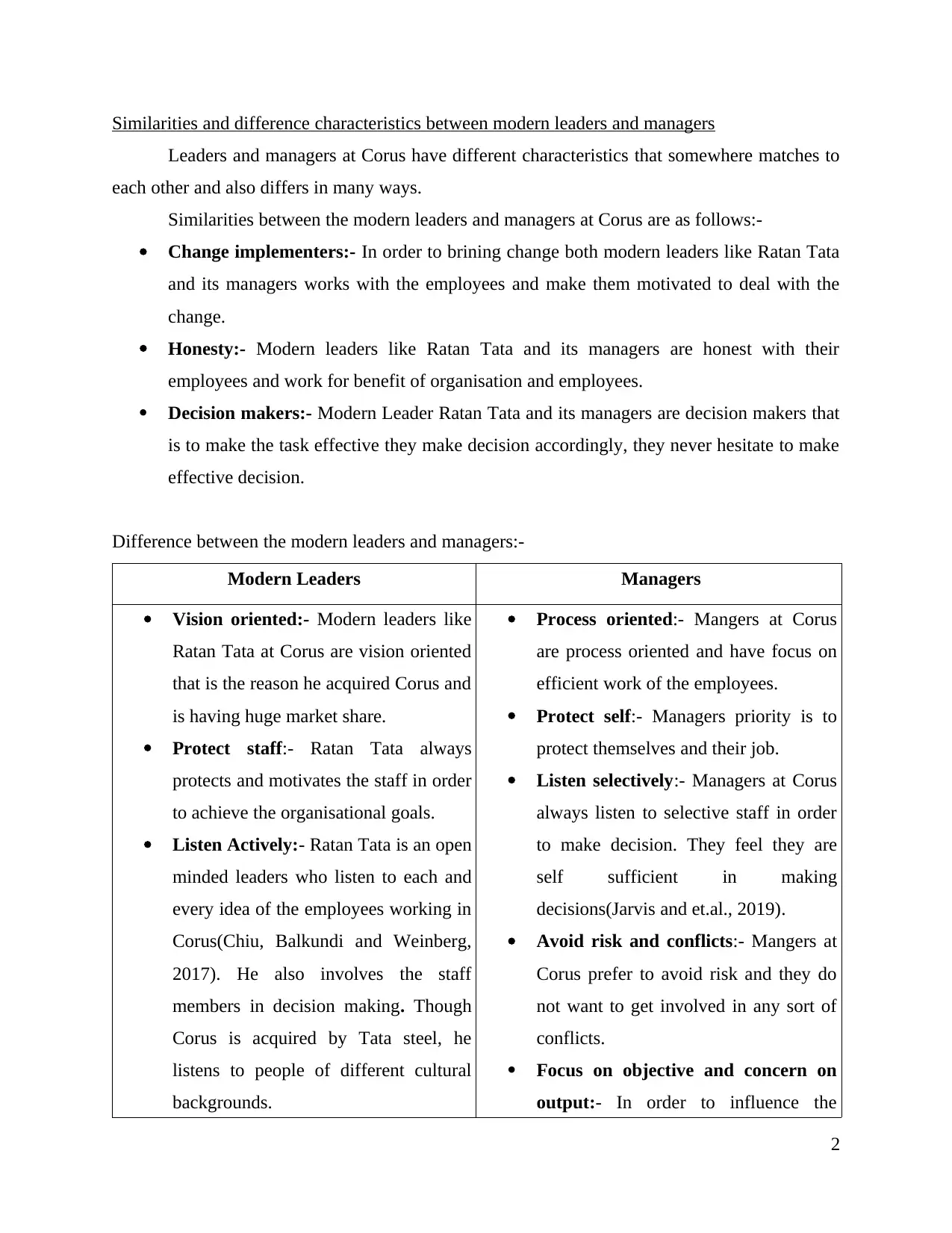
Similarities and difference characteristics between modern leaders and managers
Leaders and managers at Corus have different characteristics that somewhere matches to
each other and also differs in many ways.
Similarities between the modern leaders and managers at Corus are as follows:-
Change implementers:- In order to brining change both modern leaders like Ratan Tata
and its managers works with the employees and make them motivated to deal with the
change.
Honesty:- Modern leaders like Ratan Tata and its managers are honest with their
employees and work for benefit of organisation and employees.
Decision makers:- Modern Leader Ratan Tata and its managers are decision makers that
is to make the task effective they make decision accordingly, they never hesitate to make
effective decision.
Difference between the modern leaders and managers:-
Modern Leaders Managers
Vision oriented:- Modern leaders like
Ratan Tata at Corus are vision oriented
that is the reason he acquired Corus and
is having huge market share.
Protect staff:- Ratan Tata always
protects and motivates the staff in order
to achieve the organisational goals.
Listen Actively:- Ratan Tata is an open
minded leaders who listen to each and
every idea of the employees working in
Corus(Chiu, Balkundi and Weinberg,
2017). He also involves the staff
members in decision making. Though
Corus is acquired by Tata steel, he
listens to people of different cultural
backgrounds.
Process oriented:- Mangers at Corus
are process oriented and have focus on
efficient work of the employees.
Protect self:- Managers priority is to
protect themselves and their job.
Listen selectively:- Managers at Corus
always listen to selective staff in order
to make decision. They feel they are
self sufficient in making
decisions(Jarvis and et.al., 2019).
Avoid risk and conflicts:- Mangers at
Corus prefer to avoid risk and they do
not want to get involved in any sort of
conflicts.
Focus on objective and concern on
output:- In order to influence the
2
Leaders and managers at Corus have different characteristics that somewhere matches to
each other and also differs in many ways.
Similarities between the modern leaders and managers at Corus are as follows:-
Change implementers:- In order to brining change both modern leaders like Ratan Tata
and its managers works with the employees and make them motivated to deal with the
change.
Honesty:- Modern leaders like Ratan Tata and its managers are honest with their
employees and work for benefit of organisation and employees.
Decision makers:- Modern Leader Ratan Tata and its managers are decision makers that
is to make the task effective they make decision accordingly, they never hesitate to make
effective decision.
Difference between the modern leaders and managers:-
Modern Leaders Managers
Vision oriented:- Modern leaders like
Ratan Tata at Corus are vision oriented
that is the reason he acquired Corus and
is having huge market share.
Protect staff:- Ratan Tata always
protects and motivates the staff in order
to achieve the organisational goals.
Listen Actively:- Ratan Tata is an open
minded leaders who listen to each and
every idea of the employees working in
Corus(Chiu, Balkundi and Weinberg,
2017). He also involves the staff
members in decision making. Though
Corus is acquired by Tata steel, he
listens to people of different cultural
backgrounds.
Process oriented:- Mangers at Corus
are process oriented and have focus on
efficient work of the employees.
Protect self:- Managers priority is to
protect themselves and their job.
Listen selectively:- Managers at Corus
always listen to selective staff in order
to make decision. They feel they are
self sufficient in making
decisions(Jarvis and et.al., 2019).
Avoid risk and conflicts:- Mangers at
Corus prefer to avoid risk and they do
not want to get involved in any sort of
conflicts.
Focus on objective and concern on
output:- In order to influence the
2
Paraphrase This Document
Need a fresh take? Get an instant paraphrase of this document with our AI Paraphraser
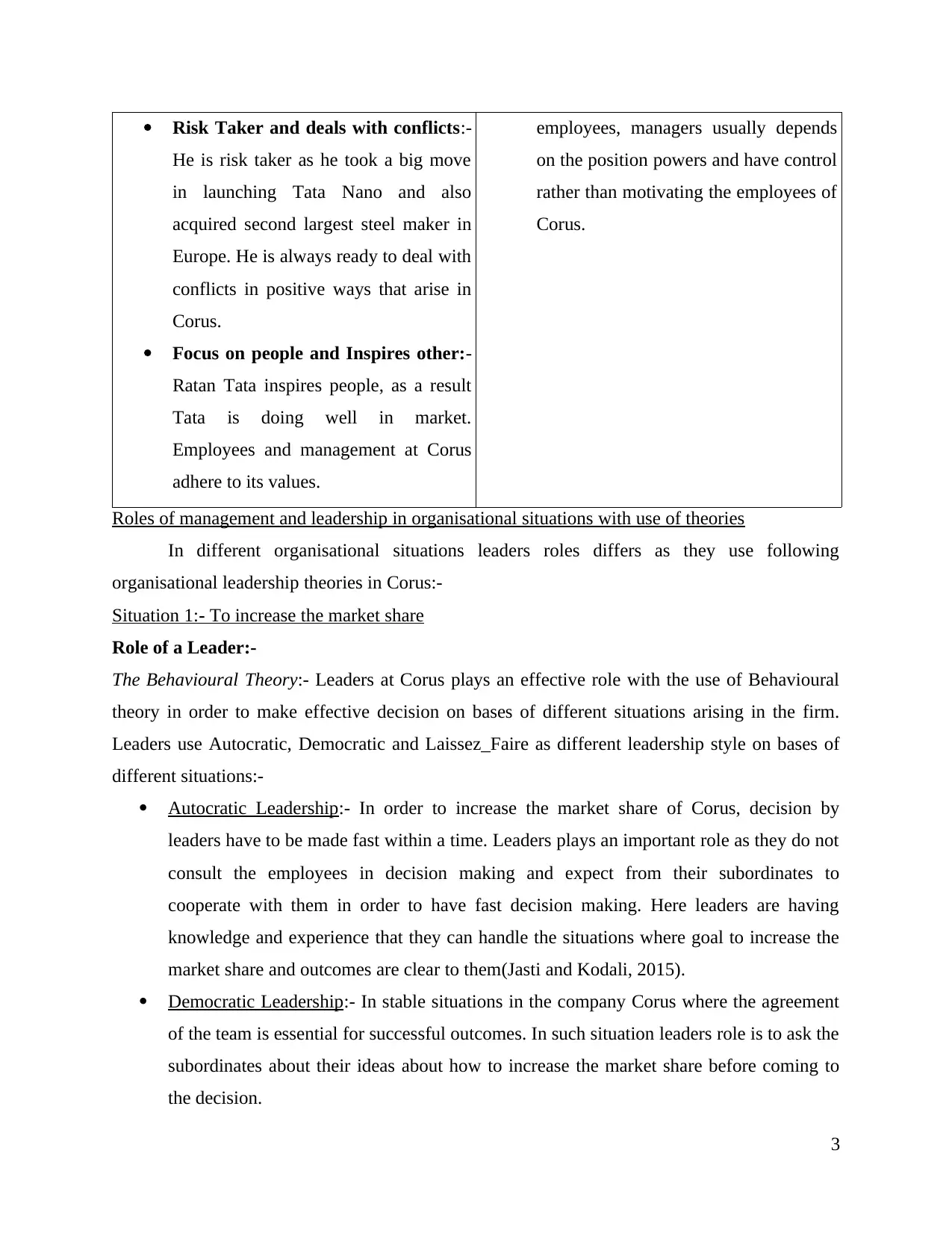
Risk Taker and deals with conflicts:-
He is risk taker as he took a big move
in launching Tata Nano and also
acquired second largest steel maker in
Europe. He is always ready to deal with
conflicts in positive ways that arise in
Corus.
Focus on people and Inspires other:-
Ratan Tata inspires people, as a result
Tata is doing well in market.
Employees and management at Corus
adhere to its values.
employees, managers usually depends
on the position powers and have control
rather than motivating the employees of
Corus.
Roles of management and leadership in organisational situations with use of theories
In different organisational situations leaders roles differs as they use following
organisational leadership theories in Corus:-
Situation 1:- To increase the market share
Role of a Leader:-
The Behavioural Theory:- Leaders at Corus plays an effective role with the use of Behavioural
theory in order to make effective decision on bases of different situations arising in the firm.
Leaders use Autocratic, Democratic and Laissez_Faire as different leadership style on bases of
different situations:-
Autocratic Leadership:- In order to increase the market share of Corus, decision by
leaders have to be made fast within a time. Leaders plays an important role as they do not
consult the employees in decision making and expect from their subordinates to
cooperate with them in order to have fast decision making. Here leaders are having
knowledge and experience that they can handle the situations where goal to increase the
market share and outcomes are clear to them(Jasti and Kodali, 2015).
Democratic Leadership:- In stable situations in the company Corus where the agreement
of the team is essential for successful outcomes. In such situation leaders role is to ask the
subordinates about their ideas about how to increase the market share before coming to
the decision.
3
He is risk taker as he took a big move
in launching Tata Nano and also
acquired second largest steel maker in
Europe. He is always ready to deal with
conflicts in positive ways that arise in
Corus.
Focus on people and Inspires other:-
Ratan Tata inspires people, as a result
Tata is doing well in market.
Employees and management at Corus
adhere to its values.
employees, managers usually depends
on the position powers and have control
rather than motivating the employees of
Corus.
Roles of management and leadership in organisational situations with use of theories
In different organisational situations leaders roles differs as they use following
organisational leadership theories in Corus:-
Situation 1:- To increase the market share
Role of a Leader:-
The Behavioural Theory:- Leaders at Corus plays an effective role with the use of Behavioural
theory in order to make effective decision on bases of different situations arising in the firm.
Leaders use Autocratic, Democratic and Laissez_Faire as different leadership style on bases of
different situations:-
Autocratic Leadership:- In order to increase the market share of Corus, decision by
leaders have to be made fast within a time. Leaders plays an important role as they do not
consult the employees in decision making and expect from their subordinates to
cooperate with them in order to have fast decision making. Here leaders are having
knowledge and experience that they can handle the situations where goal to increase the
market share and outcomes are clear to them(Jasti and Kodali, 2015).
Democratic Leadership:- In stable situations in the company Corus where the agreement
of the team is essential for successful outcomes. In such situation leaders role is to ask the
subordinates about their ideas about how to increase the market share before coming to
the decision.
3
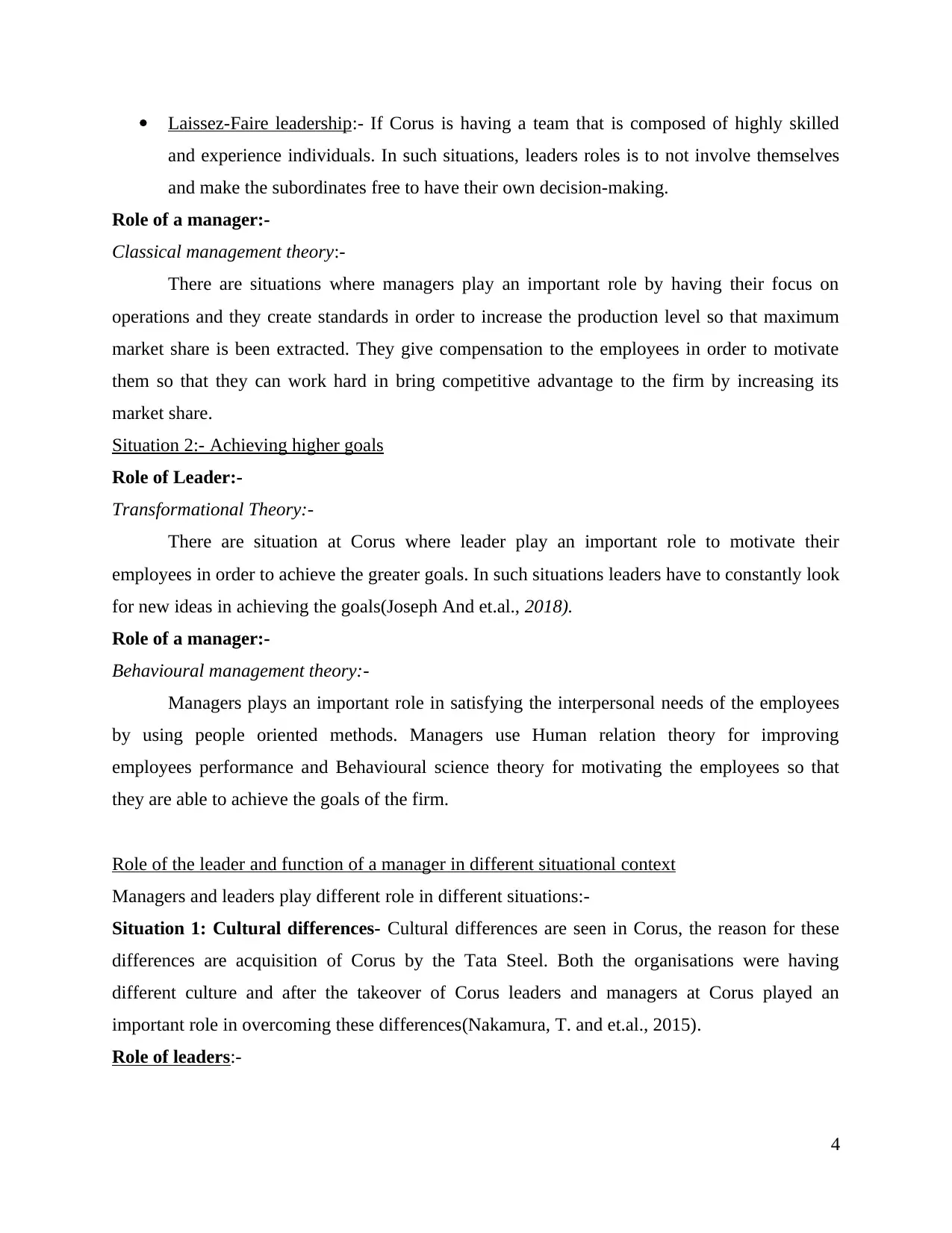
Laissez-Faire leadership:- If Corus is having a team that is composed of highly skilled
and experience individuals. In such situations, leaders roles is to not involve themselves
and make the subordinates free to have their own decision-making.
Role of a manager:-
Classical management theory:-
There are situations where managers play an important role by having their focus on
operations and they create standards in order to increase the production level so that maximum
market share is been extracted. They give compensation to the employees in order to motivate
them so that they can work hard in bring competitive advantage to the firm by increasing its
market share.
Situation 2:- Achieving higher goals
Role of Leader:-
Transformational Theory:-
There are situation at Corus where leader play an important role to motivate their
employees in order to achieve the greater goals. In such situations leaders have to constantly look
for new ideas in achieving the goals(Joseph And et.al., 2018).
Role of a manager:-
Behavioural management theory:-
Managers plays an important role in satisfying the interpersonal needs of the employees
by using people oriented methods. Managers use Human relation theory for improving
employees performance and Behavioural science theory for motivating the employees so that
they are able to achieve the goals of the firm.
Role of the leader and function of a manager in different situational context
Managers and leaders play different role in different situations:-
Situation 1: Cultural differences- Cultural differences are seen in Corus, the reason for these
differences are acquisition of Corus by the Tata Steel. Both the organisations were having
different culture and after the takeover of Corus leaders and managers at Corus played an
important role in overcoming these differences(Nakamura, T. and et.al., 2015).
Role of leaders:-
4
and experience individuals. In such situations, leaders roles is to not involve themselves
and make the subordinates free to have their own decision-making.
Role of a manager:-
Classical management theory:-
There are situations where managers play an important role by having their focus on
operations and they create standards in order to increase the production level so that maximum
market share is been extracted. They give compensation to the employees in order to motivate
them so that they can work hard in bring competitive advantage to the firm by increasing its
market share.
Situation 2:- Achieving higher goals
Role of Leader:-
Transformational Theory:-
There are situation at Corus where leader play an important role to motivate their
employees in order to achieve the greater goals. In such situations leaders have to constantly look
for new ideas in achieving the goals(Joseph And et.al., 2018).
Role of a manager:-
Behavioural management theory:-
Managers plays an important role in satisfying the interpersonal needs of the employees
by using people oriented methods. Managers use Human relation theory for improving
employees performance and Behavioural science theory for motivating the employees so that
they are able to achieve the goals of the firm.
Role of the leader and function of a manager in different situational context
Managers and leaders play different role in different situations:-
Situation 1: Cultural differences- Cultural differences are seen in Corus, the reason for these
differences are acquisition of Corus by the Tata Steel. Both the organisations were having
different culture and after the takeover of Corus leaders and managers at Corus played an
important role in overcoming these differences(Nakamura, T. and et.al., 2015).
Role of leaders:-
4
⊘ This is a preview!⊘
Do you want full access?
Subscribe today to unlock all pages.

Trusted by 1+ million students worldwide
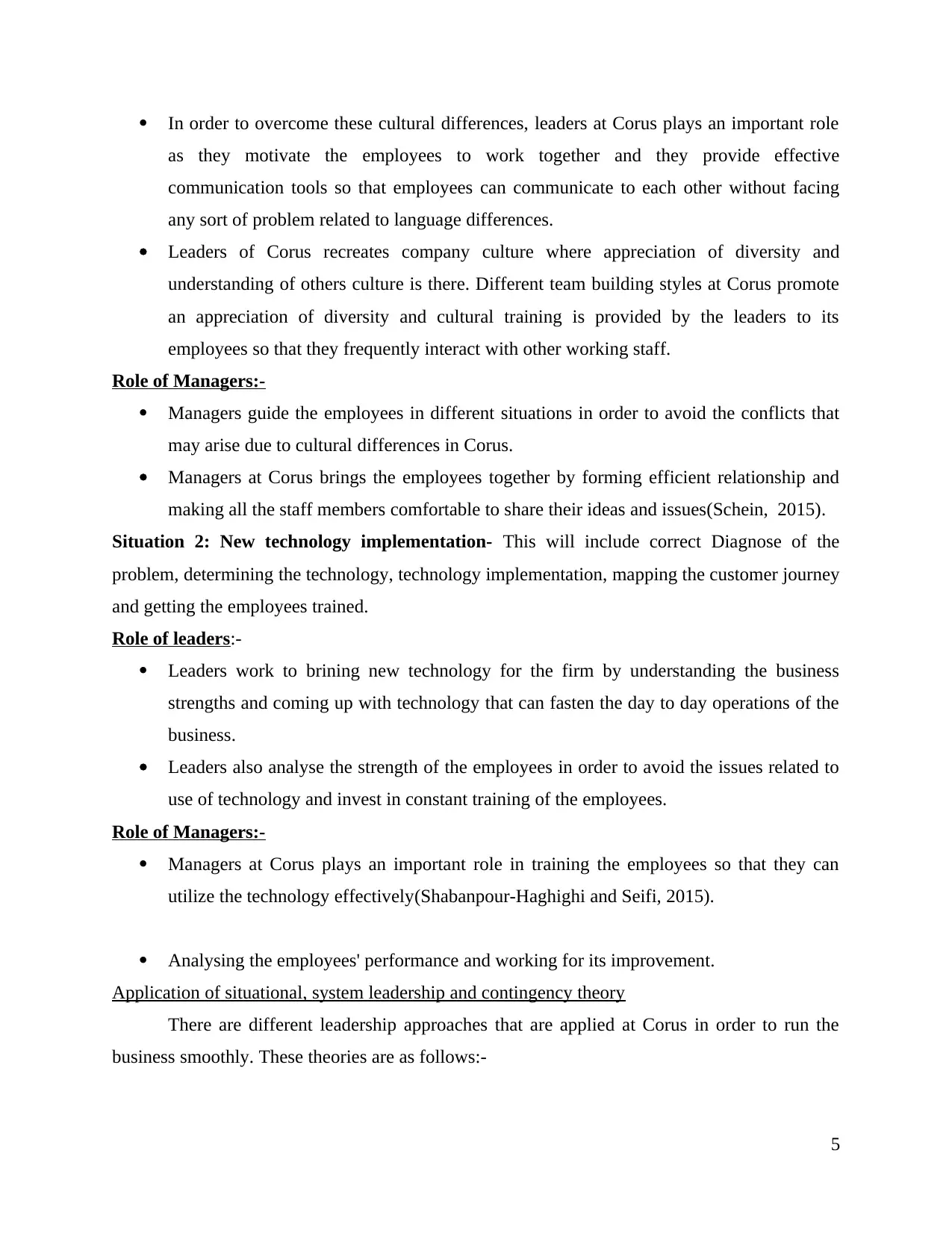
In order to overcome these cultural differences, leaders at Corus plays an important role
as they motivate the employees to work together and they provide effective
communication tools so that employees can communicate to each other without facing
any sort of problem related to language differences.
Leaders of Corus recreates company culture where appreciation of diversity and
understanding of others culture is there. Different team building styles at Corus promote
an appreciation of diversity and cultural training is provided by the leaders to its
employees so that they frequently interact with other working staff.
Role of Managers:-
Managers guide the employees in different situations in order to avoid the conflicts that
may arise due to cultural differences in Corus.
Managers at Corus brings the employees together by forming efficient relationship and
making all the staff members comfortable to share their ideas and issues(Schein, 2015).
Situation 2: New technology implementation- This will include correct Diagnose of the
problem, determining the technology, technology implementation, mapping the customer journey
and getting the employees trained.
Role of leaders:-
Leaders work to brining new technology for the firm by understanding the business
strengths and coming up with technology that can fasten the day to day operations of the
business.
Leaders also analyse the strength of the employees in order to avoid the issues related to
use of technology and invest in constant training of the employees.
Role of Managers:-
Managers at Corus plays an important role in training the employees so that they can
utilize the technology effectively(Shabanpour-Haghighi and Seifi, 2015).
Analysing the employees' performance and working for its improvement.
Application of situational, system leadership and contingency theory
There are different leadership approaches that are applied at Corus in order to run the
business smoothly. These theories are as follows:-
5
as they motivate the employees to work together and they provide effective
communication tools so that employees can communicate to each other without facing
any sort of problem related to language differences.
Leaders of Corus recreates company culture where appreciation of diversity and
understanding of others culture is there. Different team building styles at Corus promote
an appreciation of diversity and cultural training is provided by the leaders to its
employees so that they frequently interact with other working staff.
Role of Managers:-
Managers guide the employees in different situations in order to avoid the conflicts that
may arise due to cultural differences in Corus.
Managers at Corus brings the employees together by forming efficient relationship and
making all the staff members comfortable to share their ideas and issues(Schein, 2015).
Situation 2: New technology implementation- This will include correct Diagnose of the
problem, determining the technology, technology implementation, mapping the customer journey
and getting the employees trained.
Role of leaders:-
Leaders work to brining new technology for the firm by understanding the business
strengths and coming up with technology that can fasten the day to day operations of the
business.
Leaders also analyse the strength of the employees in order to avoid the issues related to
use of technology and invest in constant training of the employees.
Role of Managers:-
Managers at Corus plays an important role in training the employees so that they can
utilize the technology effectively(Shabanpour-Haghighi and Seifi, 2015).
Analysing the employees' performance and working for its improvement.
Application of situational, system leadership and contingency theory
There are different leadership approaches that are applied at Corus in order to run the
business smoothly. These theories are as follows:-
5
Paraphrase This Document
Need a fresh take? Get an instant paraphrase of this document with our AI Paraphraser
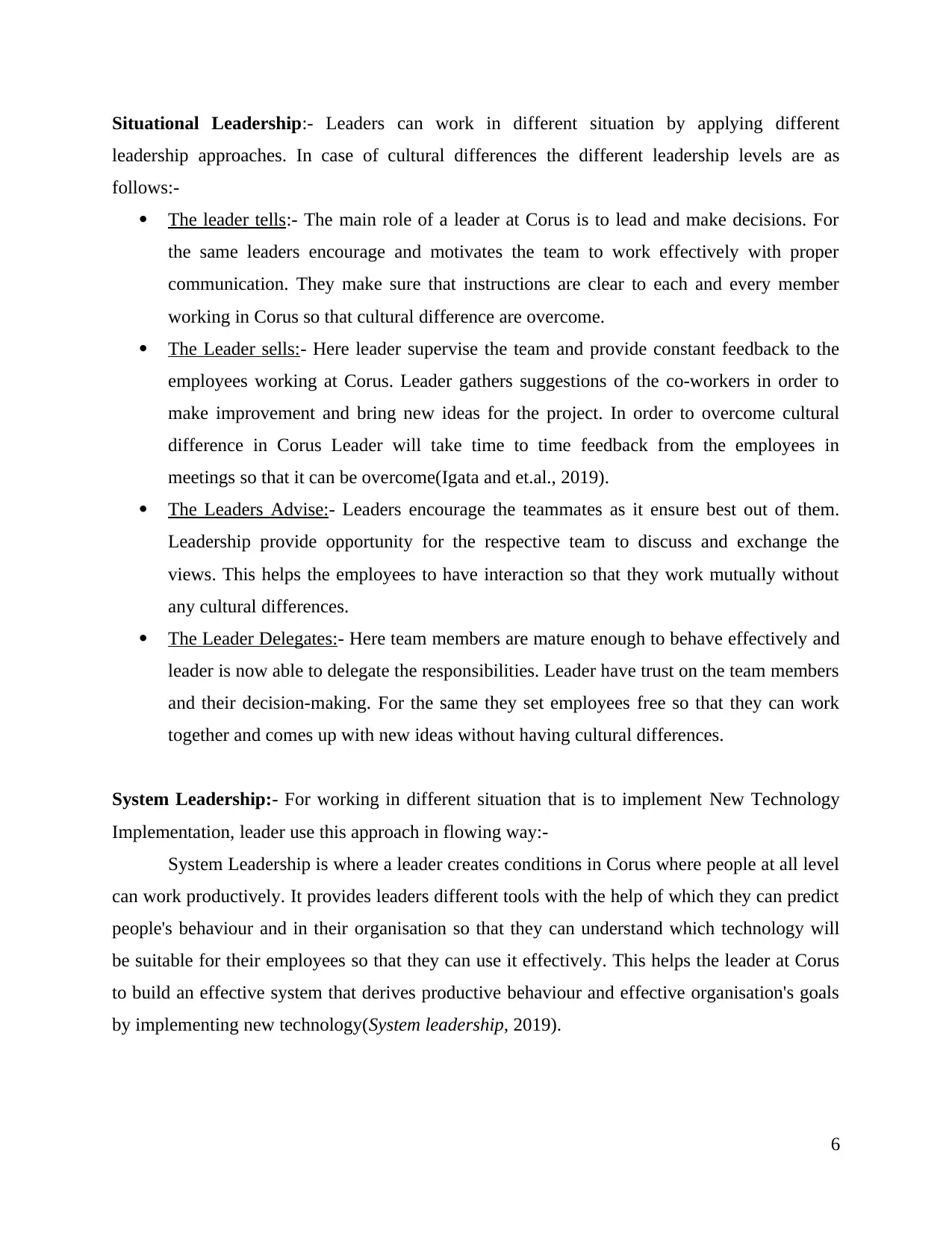
Situational Leadership:- Leaders can work in different situation by applying different
leadership approaches. In case of cultural differences the different leadership levels are as
follows:-
The leader tells:- The main role of a leader at Corus is to lead and make decisions. For
the same leaders encourage and motivates the team to work effectively with proper
communication. They make sure that instructions are clear to each and every member
working in Corus so that cultural difference are overcome.
The Leader sells:- Here leader supervise the team and provide constant feedback to the
employees working at Corus. Leader gathers suggestions of the co-workers in order to
make improvement and bring new ideas for the project. In order to overcome cultural
difference in Corus Leader will take time to time feedback from the employees in
meetings so that it can be overcome(Igata and et.al., 2019).
The Leaders Advise:- Leaders encourage the teammates as it ensure best out of them.
Leadership provide opportunity for the respective team to discuss and exchange the
views. This helps the employees to have interaction so that they work mutually without
any cultural differences.
The Leader Delegates:- Here team members are mature enough to behave effectively and
leader is now able to delegate the responsibilities. Leader have trust on the team members
and their decision-making. For the same they set employees free so that they can work
together and comes up with new ideas without having cultural differences.
System Leadership:- For working in different situation that is to implement New Technology
Implementation, leader use this approach in flowing way:-
System Leadership is where a leader creates conditions in Corus where people at all level
can work productively. It provides leaders different tools with the help of which they can predict
people's behaviour and in their organisation so that they can understand which technology will
be suitable for their employees so that they can use it effectively. This helps the leader at Corus
to build an effective system that derives productive behaviour and effective organisation's goals
by implementing new technology(System leadership, 2019).
6
leadership approaches. In case of cultural differences the different leadership levels are as
follows:-
The leader tells:- The main role of a leader at Corus is to lead and make decisions. For
the same leaders encourage and motivates the team to work effectively with proper
communication. They make sure that instructions are clear to each and every member
working in Corus so that cultural difference are overcome.
The Leader sells:- Here leader supervise the team and provide constant feedback to the
employees working at Corus. Leader gathers suggestions of the co-workers in order to
make improvement and bring new ideas for the project. In order to overcome cultural
difference in Corus Leader will take time to time feedback from the employees in
meetings so that it can be overcome(Igata and et.al., 2019).
The Leaders Advise:- Leaders encourage the teammates as it ensure best out of them.
Leadership provide opportunity for the respective team to discuss and exchange the
views. This helps the employees to have interaction so that they work mutually without
any cultural differences.
The Leader Delegates:- Here team members are mature enough to behave effectively and
leader is now able to delegate the responsibilities. Leader have trust on the team members
and their decision-making. For the same they set employees free so that they can work
together and comes up with new ideas without having cultural differences.
System Leadership:- For working in different situation that is to implement New Technology
Implementation, leader use this approach in flowing way:-
System Leadership is where a leader creates conditions in Corus where people at all level
can work productively. It provides leaders different tools with the help of which they can predict
people's behaviour and in their organisation so that they can understand which technology will
be suitable for their employees so that they can use it effectively. This helps the leader at Corus
to build an effective system that derives productive behaviour and effective organisation's goals
by implementing new technology(System leadership, 2019).
6
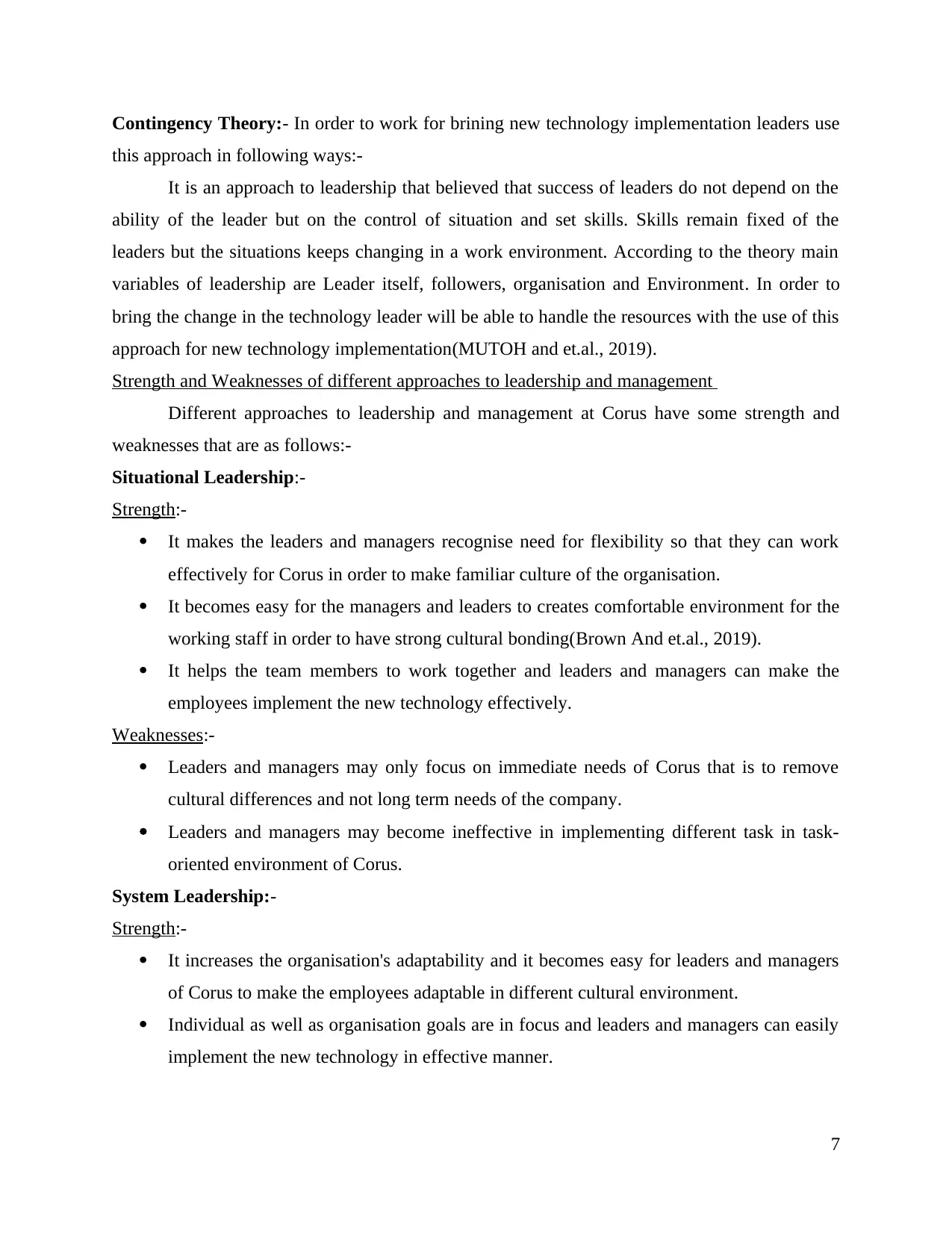
Contingency Theory:- In order to work for brining new technology implementation leaders use
this approach in following ways:-
It is an approach to leadership that believed that success of leaders do not depend on the
ability of the leader but on the control of situation and set skills. Skills remain fixed of the
leaders but the situations keeps changing in a work environment. According to the theory main
variables of leadership are Leader itself, followers, organisation and Environment. In order to
bring the change in the technology leader will be able to handle the resources with the use of this
approach for new technology implementation(MUTOH and et.al., 2019).
Strength and Weaknesses of different approaches to leadership and management
Different approaches to leadership and management at Corus have some strength and
weaknesses that are as follows:-
Situational Leadership:-
Strength:-
It makes the leaders and managers recognise need for flexibility so that they can work
effectively for Corus in order to make familiar culture of the organisation.
It becomes easy for the managers and leaders to creates comfortable environment for the
working staff in order to have strong cultural bonding(Brown And et.al., 2019).
It helps the team members to work together and leaders and managers can make the
employees implement the new technology effectively.
Weaknesses:-
Leaders and managers may only focus on immediate needs of Corus that is to remove
cultural differences and not long term needs of the company.
Leaders and managers may become ineffective in implementing different task in task-
oriented environment of Corus.
System Leadership:-
Strength:-
It increases the organisation's adaptability and it becomes easy for leaders and managers
of Corus to make the employees adaptable in different cultural environment.
Individual as well as organisation goals are in focus and leaders and managers can easily
implement the new technology in effective manner.
7
this approach in following ways:-
It is an approach to leadership that believed that success of leaders do not depend on the
ability of the leader but on the control of situation and set skills. Skills remain fixed of the
leaders but the situations keeps changing in a work environment. According to the theory main
variables of leadership are Leader itself, followers, organisation and Environment. In order to
bring the change in the technology leader will be able to handle the resources with the use of this
approach for new technology implementation(MUTOH and et.al., 2019).
Strength and Weaknesses of different approaches to leadership and management
Different approaches to leadership and management at Corus have some strength and
weaknesses that are as follows:-
Situational Leadership:-
Strength:-
It makes the leaders and managers recognise need for flexibility so that they can work
effectively for Corus in order to make familiar culture of the organisation.
It becomes easy for the managers and leaders to creates comfortable environment for the
working staff in order to have strong cultural bonding(Brown And et.al., 2019).
It helps the team members to work together and leaders and managers can make the
employees implement the new technology effectively.
Weaknesses:-
Leaders and managers may only focus on immediate needs of Corus that is to remove
cultural differences and not long term needs of the company.
Leaders and managers may become ineffective in implementing different task in task-
oriented environment of Corus.
System Leadership:-
Strength:-
It increases the organisation's adaptability and it becomes easy for leaders and managers
of Corus to make the employees adaptable in different cultural environment.
Individual as well as organisation goals are in focus and leaders and managers can easily
implement the new technology in effective manner.
7
⊘ This is a preview!⊘
Do you want full access?
Subscribe today to unlock all pages.

Trusted by 1+ million students worldwide
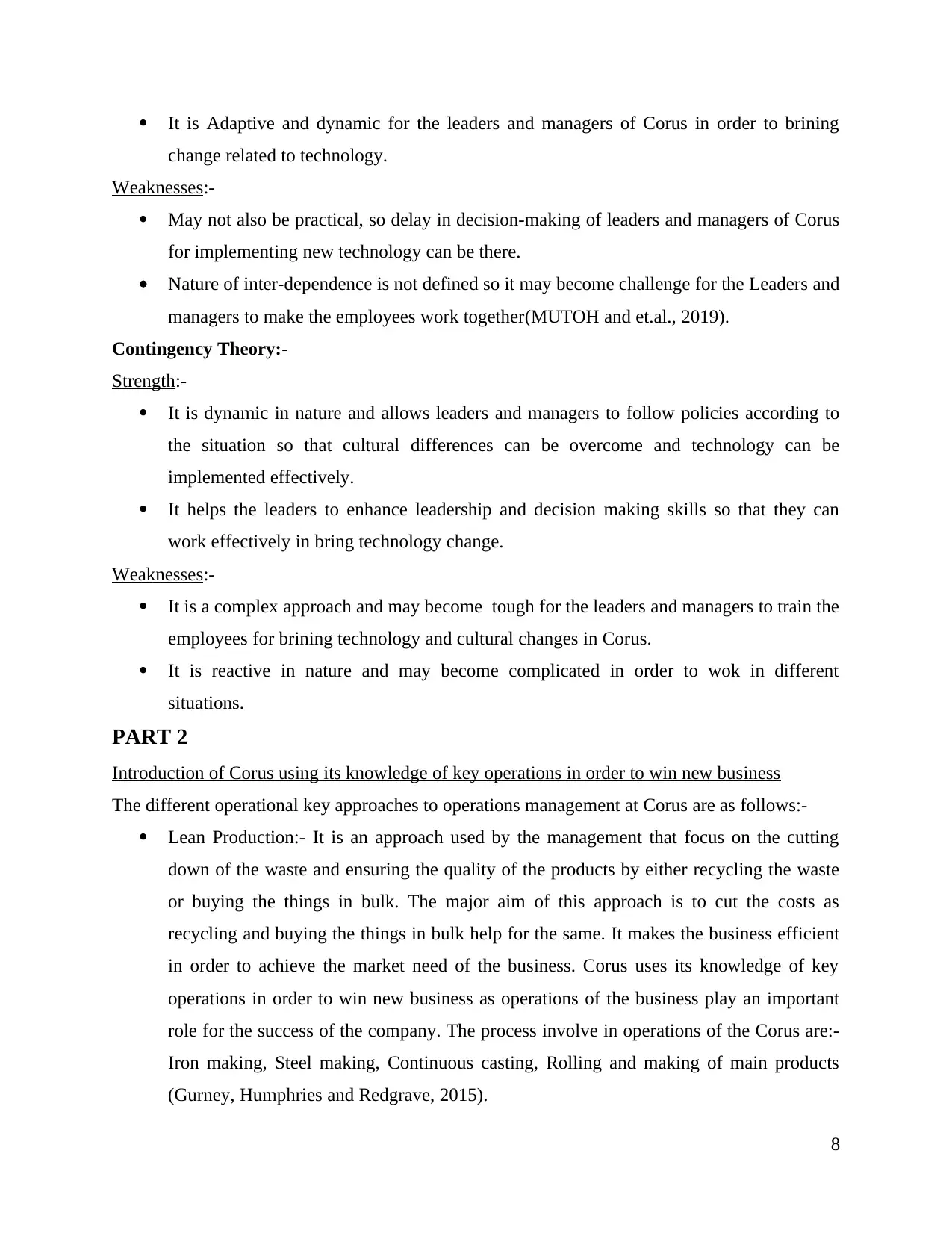
It is Adaptive and dynamic for the leaders and managers of Corus in order to brining
change related to technology.
Weaknesses:-
May not also be practical, so delay in decision-making of leaders and managers of Corus
for implementing new technology can be there.
Nature of inter-dependence is not defined so it may become challenge for the Leaders and
managers to make the employees work together(MUTOH and et.al., 2019).
Contingency Theory:-
Strength:-
It is dynamic in nature and allows leaders and managers to follow policies according to
the situation so that cultural differences can be overcome and technology can be
implemented effectively.
It helps the leaders to enhance leadership and decision making skills so that they can
work effectively in bring technology change.
Weaknesses:-
It is a complex approach and may become tough for the leaders and managers to train the
employees for brining technology and cultural changes in Corus.
It is reactive in nature and may become complicated in order to wok in different
situations.
PART 2
Introduction of Corus using its knowledge of key operations in order to win new business
The different operational key approaches to operations management at Corus are as follows:-
Lean Production:- It is an approach used by the management that focus on the cutting
down of the waste and ensuring the quality of the products by either recycling the waste
or buying the things in bulk. The major aim of this approach is to cut the costs as
recycling and buying the things in bulk help for the same. It makes the business efficient
in order to achieve the market need of the business. Corus uses its knowledge of key
operations in order to win new business as operations of the business play an important
role for the success of the company. The process involve in operations of the Corus are:-
Iron making, Steel making, Continuous casting, Rolling and making of main products
(Gurney, Humphries and Redgrave, 2015).
8
change related to technology.
Weaknesses:-
May not also be practical, so delay in decision-making of leaders and managers of Corus
for implementing new technology can be there.
Nature of inter-dependence is not defined so it may become challenge for the Leaders and
managers to make the employees work together(MUTOH and et.al., 2019).
Contingency Theory:-
Strength:-
It is dynamic in nature and allows leaders and managers to follow policies according to
the situation so that cultural differences can be overcome and technology can be
implemented effectively.
It helps the leaders to enhance leadership and decision making skills so that they can
work effectively in bring technology change.
Weaknesses:-
It is a complex approach and may become tough for the leaders and managers to train the
employees for brining technology and cultural changes in Corus.
It is reactive in nature and may become complicated in order to wok in different
situations.
PART 2
Introduction of Corus using its knowledge of key operations in order to win new business
The different operational key approaches to operations management at Corus are as follows:-
Lean Production:- It is an approach used by the management that focus on the cutting
down of the waste and ensuring the quality of the products by either recycling the waste
or buying the things in bulk. The major aim of this approach is to cut the costs as
recycling and buying the things in bulk help for the same. It makes the business efficient
in order to achieve the market need of the business. Corus uses its knowledge of key
operations in order to win new business as operations of the business play an important
role for the success of the company. The process involve in operations of the Corus are:-
Iron making, Steel making, Continuous casting, Rolling and making of main products
(Gurney, Humphries and Redgrave, 2015).
8
Paraphrase This Document
Need a fresh take? Get an instant paraphrase of this document with our AI Paraphraser
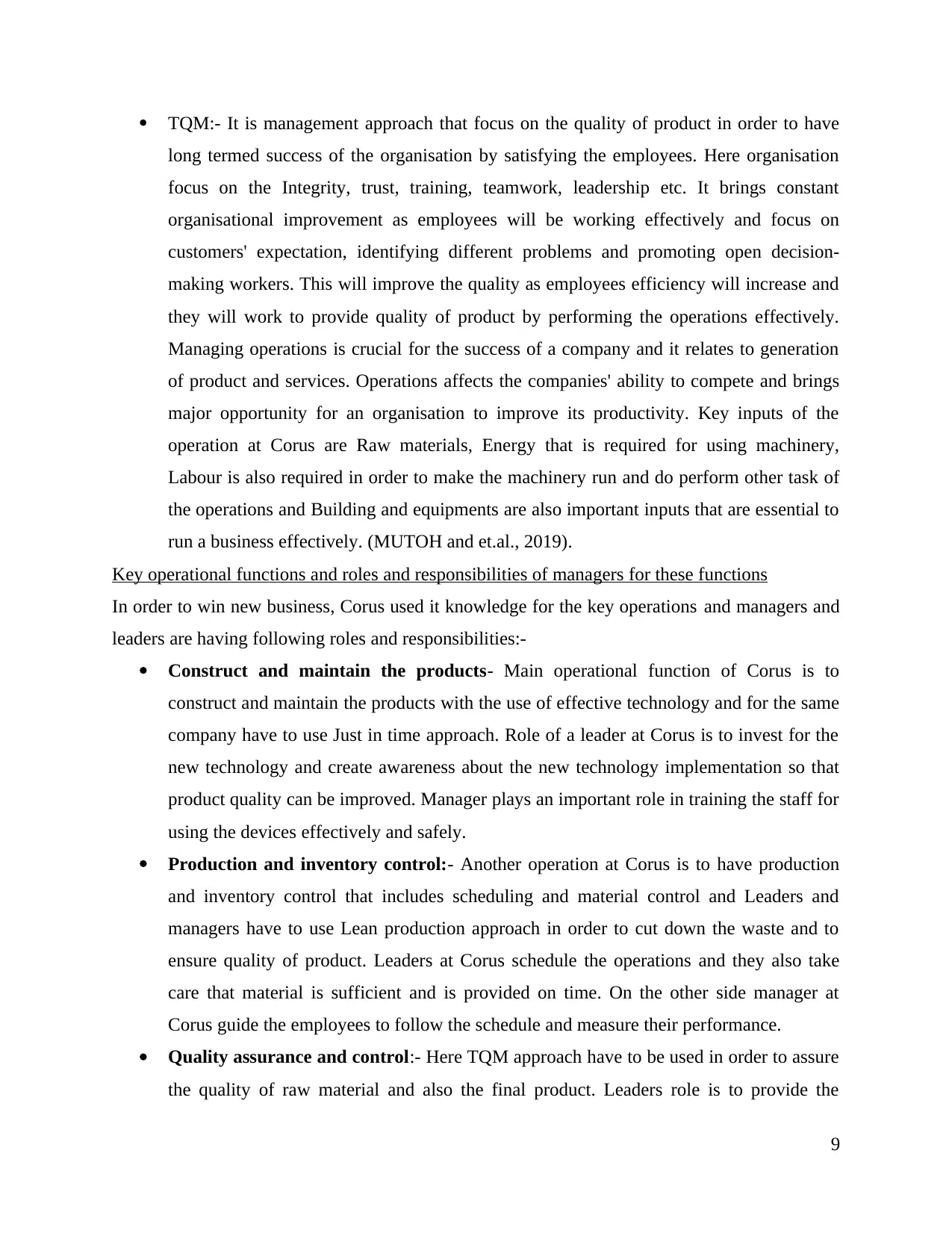
TQM:- It is management approach that focus on the quality of product in order to have
long termed success of the organisation by satisfying the employees. Here organisation
focus on the Integrity, trust, training, teamwork, leadership etc. It brings constant
organisational improvement as employees will be working effectively and focus on
customers' expectation, identifying different problems and promoting open decision-
making workers. This will improve the quality as employees efficiency will increase and
they will work to provide quality of product by performing the operations effectively.
Managing operations is crucial for the success of a company and it relates to generation
of product and services. Operations affects the companies' ability to compete and brings
major opportunity for an organisation to improve its productivity. Key inputs of the
operation at Corus are Raw materials, Energy that is required for using machinery,
Labour is also required in order to make the machinery run and do perform other task of
the operations and Building and equipments are also important inputs that are essential to
run a business effectively. (MUTOH and et.al., 2019).
Key operational functions and roles and responsibilities of managers for these functions
In order to win new business, Corus used it knowledge for the key operations and managers and
leaders are having following roles and responsibilities:-
Construct and maintain the products- Main operational function of Corus is to
construct and maintain the products with the use of effective technology and for the same
company have to use Just in time approach. Role of a leader at Corus is to invest for the
new technology and create awareness about the new technology implementation so that
product quality can be improved. Manager plays an important role in training the staff for
using the devices effectively and safely.
Production and inventory control:- Another operation at Corus is to have production
and inventory control that includes scheduling and material control and Leaders and
managers have to use Lean production approach in order to cut down the waste and to
ensure quality of product. Leaders at Corus schedule the operations and they also take
care that material is sufficient and is provided on time. On the other side manager at
Corus guide the employees to follow the schedule and measure their performance.
Quality assurance and control:- Here TQM approach have to be used in order to assure
the quality of raw material and also the final product. Leaders role is to provide the
9
long termed success of the organisation by satisfying the employees. Here organisation
focus on the Integrity, trust, training, teamwork, leadership etc. It brings constant
organisational improvement as employees will be working effectively and focus on
customers' expectation, identifying different problems and promoting open decision-
making workers. This will improve the quality as employees efficiency will increase and
they will work to provide quality of product by performing the operations effectively.
Managing operations is crucial for the success of a company and it relates to generation
of product and services. Operations affects the companies' ability to compete and brings
major opportunity for an organisation to improve its productivity. Key inputs of the
operation at Corus are Raw materials, Energy that is required for using machinery,
Labour is also required in order to make the machinery run and do perform other task of
the operations and Building and equipments are also important inputs that are essential to
run a business effectively. (MUTOH and et.al., 2019).
Key operational functions and roles and responsibilities of managers for these functions
In order to win new business, Corus used it knowledge for the key operations and managers and
leaders are having following roles and responsibilities:-
Construct and maintain the products- Main operational function of Corus is to
construct and maintain the products with the use of effective technology and for the same
company have to use Just in time approach. Role of a leader at Corus is to invest for the
new technology and create awareness about the new technology implementation so that
product quality can be improved. Manager plays an important role in training the staff for
using the devices effectively and safely.
Production and inventory control:- Another operation at Corus is to have production
and inventory control that includes scheduling and material control and Leaders and
managers have to use Lean production approach in order to cut down the waste and to
ensure quality of product. Leaders at Corus schedule the operations and they also take
care that material is sufficient and is provided on time. On the other side manager at
Corus guide the employees to follow the schedule and measure their performance.
Quality assurance and control:- Here TQM approach have to be used in order to assure
the quality of raw material and also the final product. Leaders role is to provide the
9
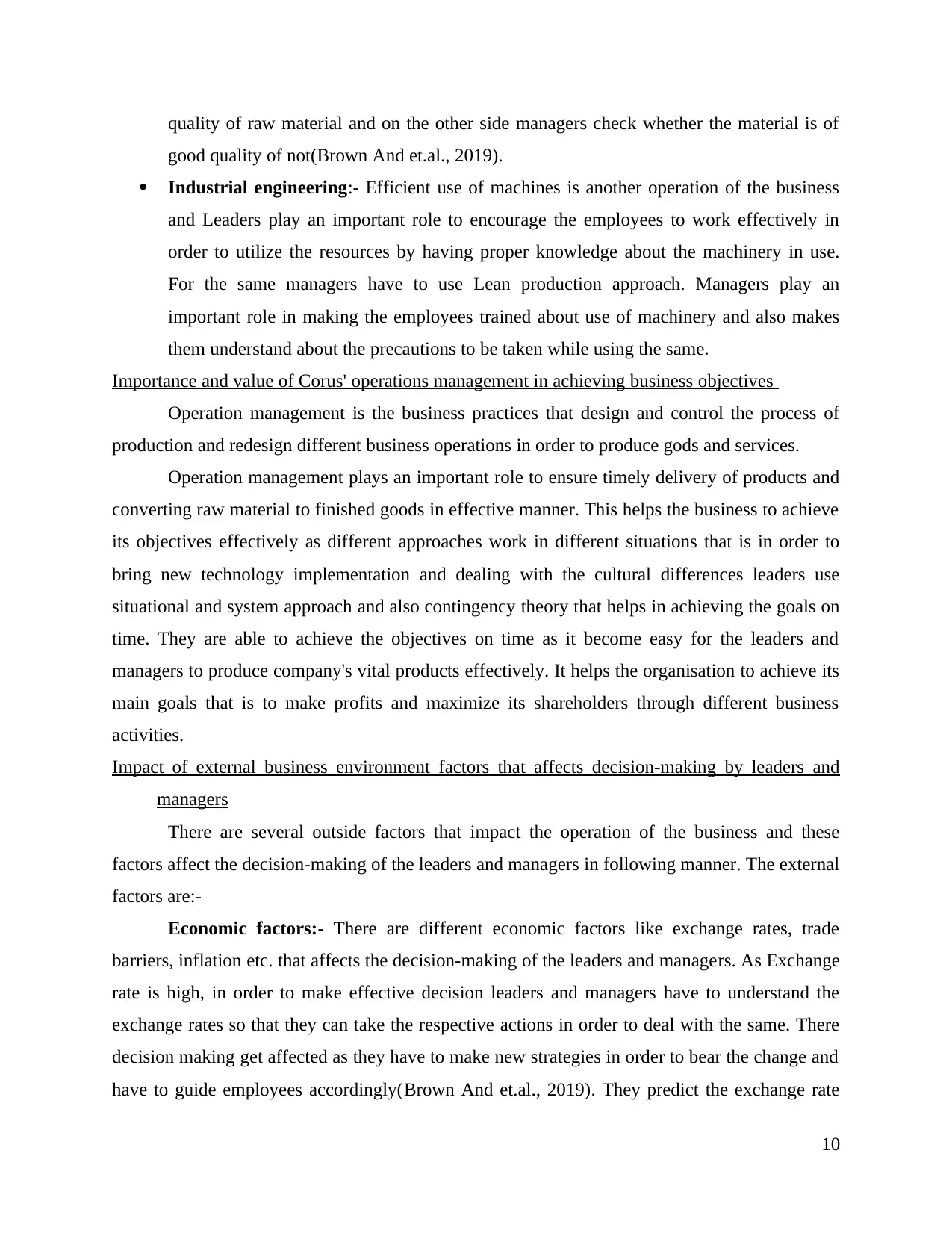
quality of raw material and on the other side managers check whether the material is of
good quality of not(Brown And et.al., 2019).
Industrial engineering:- Efficient use of machines is another operation of the business
and Leaders play an important role to encourage the employees to work effectively in
order to utilize the resources by having proper knowledge about the machinery in use.
For the same managers have to use Lean production approach. Managers play an
important role in making the employees trained about use of machinery and also makes
them understand about the precautions to be taken while using the same.
Importance and value of Corus' operations management in achieving business objectives
Operation management is the business practices that design and control the process of
production and redesign different business operations in order to produce gods and services.
Operation management plays an important role to ensure timely delivery of products and
converting raw material to finished goods in effective manner. This helps the business to achieve
its objectives effectively as different approaches work in different situations that is in order to
bring new technology implementation and dealing with the cultural differences leaders use
situational and system approach and also contingency theory that helps in achieving the goals on
time. They are able to achieve the objectives on time as it become easy for the leaders and
managers to produce company's vital products effectively. It helps the organisation to achieve its
main goals that is to make profits and maximize its shareholders through different business
activities.
Impact of external business environment factors that affects decision-making by leaders and
managers
There are several outside factors that impact the operation of the business and these
factors affect the decision-making of the leaders and managers in following manner. The external
factors are:-
Economic factors:- There are different economic factors like exchange rates, trade
barriers, inflation etc. that affects the decision-making of the leaders and managers. As Exchange
rate is high, in order to make effective decision leaders and managers have to understand the
exchange rates so that they can take the respective actions in order to deal with the same. There
decision making get affected as they have to make new strategies in order to bear the change and
have to guide employees accordingly(Brown And et.al., 2019). They predict the exchange rate
10
good quality of not(Brown And et.al., 2019).
Industrial engineering:- Efficient use of machines is another operation of the business
and Leaders play an important role to encourage the employees to work effectively in
order to utilize the resources by having proper knowledge about the machinery in use.
For the same managers have to use Lean production approach. Managers play an
important role in making the employees trained about use of machinery and also makes
them understand about the precautions to be taken while using the same.
Importance and value of Corus' operations management in achieving business objectives
Operation management is the business practices that design and control the process of
production and redesign different business operations in order to produce gods and services.
Operation management plays an important role to ensure timely delivery of products and
converting raw material to finished goods in effective manner. This helps the business to achieve
its objectives effectively as different approaches work in different situations that is in order to
bring new technology implementation and dealing with the cultural differences leaders use
situational and system approach and also contingency theory that helps in achieving the goals on
time. They are able to achieve the objectives on time as it become easy for the leaders and
managers to produce company's vital products effectively. It helps the organisation to achieve its
main goals that is to make profits and maximize its shareholders through different business
activities.
Impact of external business environment factors that affects decision-making by leaders and
managers
There are several outside factors that impact the operation of the business and these
factors affect the decision-making of the leaders and managers in following manner. The external
factors are:-
Economic factors:- There are different economic factors like exchange rates, trade
barriers, inflation etc. that affects the decision-making of the leaders and managers. As Exchange
rate is high, in order to make effective decision leaders and managers have to understand the
exchange rates so that they can take the respective actions in order to deal with the same. There
decision making get affected as they have to make new strategies in order to bear the change and
have to guide employees accordingly(Brown And et.al., 2019). They predict the exchange rate
10
⊘ This is a preview!⊘
Do you want full access?
Subscribe today to unlock all pages.

Trusted by 1+ million students worldwide
1 out of 16
Related Documents
Your All-in-One AI-Powered Toolkit for Academic Success.
+13062052269
info@desklib.com
Available 24*7 on WhatsApp / Email
![[object Object]](/_next/static/media/star-bottom.7253800d.svg)
Unlock your academic potential
Copyright © 2020–2026 A2Z Services. All Rights Reserved. Developed and managed by ZUCOL.




